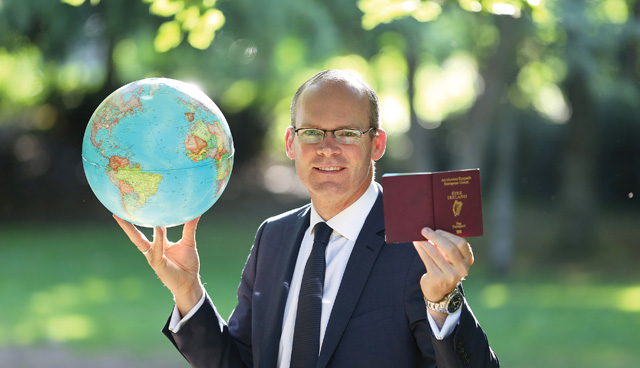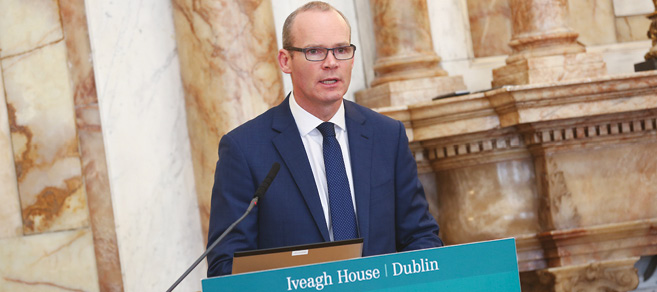In the search for solution

Ciarán Galway speaks with Ireland’s Minister for Foreign Affairs, Simon Coveney about his role in the Brexit negotiations and efforts to resuscitate an ailing Northern Ireland Executive.
Britain’s relationship with Ireland is a complex entanglement. For centuries, the connection was asymmetrical, with the island toiling to emerge from the domineering shadow of its nearest neighbour. Even post-independence, where England led, nascent Ireland often followed. In 2017, having underwent an almost miraculous, though painful economic recovery, a revitalised and confident Ireland, with the diplomatic and economic wind of the EU at its back, is now in as strong a position as at any time in modern history.
Presently, however, this is offset somewhat by the potential affliction of collateral damage to the island, north and south, as Britain extricates itself from the European project. Minister Coveney’s remit is inextricably coloured by a kaleidoscope of impediments unearthed by Brexit. In spite of the mammoth test for Ireland’s diplomatic fortitude, Coveney has exhibited a propensity to stand firm in the State’s interests.
Present position
Outlining the Government’s present position on Brexit negotiations, Coveney asserts: “I have repeatedly said – so has the Taoiseach, the previous Minister for Foreign Affairs and the previous Taoiseach – that Ireland intends to work extremely hard to make sure that there is a negotiated solution here and that Brexit can happen in a way that limits the damage and takes the opportunities.”
At the same time, the Minister acknowledges a responsibility to put contingency planning in place for all eventualities. As such, while nobody wants a Brexit where Britain crashes out of the European Union without agreement on the future relationship, “we have to ensure that should that happen, Ireland has anticipated it and tries to manage that”.
Sufficient progress
Speaking prior to an agreement on phase one, Coveney welcomed progress made on a recognising the complexity of full implementation of the Good Friday Agreement. The Minister draws attention to the many agreed North-South co-operation projects and policies that essentially are built on the back of EU membership, north and south. For instance, the mirrored regulatory environment in terms of agriculture, animal health, food safety and environmental management. “I think the complexity of that is now clear to both negotiating teams. So, we are in the middle of a mapping exercise to try to itemise issue by issue, how we might be able to deal with that,” he discloses.
The area in which Coveney feels the most progress has been made is the common travel area which concerns the movement of British and Irish citizens between the islands, working, accessing welfare, support and pensions. “I think that one of the early wins of these negotiations, although it’s not that clear at this stage, will be an acceptance, by both sides, that the common travel area as we understand it will be maintained.
Sense of clarity
While it is no secret that the British Government and likewise the Conservative Party are divided on their approach to Brexit, the Foreign Affairs Minister suggests that Prime Minister Theresa May’s Florence speech was a step in the right direction.
However, he does not believe it has been reflected in negotiations, particularly on the border issues. “I think there is a need for more clarity, more detail and, quite frankly, more realism in terms of what’s possible and what’s not if we are going to fulfil the aspiration of not having any border that is a restrictor on trade and the movement of goods.
“This isn’t simply about whether or not there is physical infrastructure on the 500km border on the island of Ireland; it is about border infrastructure generally and how that impacts on businesses and the bureaucracy that comes from the normal trade on the island of Ireland. I think there is a need for a lot more detailed work and more political clarity in terms of how Britain intends to achieve that within their overall approach.”
Resource allocation
Efforts to mitigate against Brexit include a significant increase in resources across government departments. For instance, Budget 2018 unveiled a ⇔300 million Brexit loan fund for businesses engaged in significant trade between Ireland and Britain, while the Department of Jobs has employed 50 additional agency staff across Enterprise Ireland, IDA and Bord Bia. New embassies are opening to assist the process of diversifying trade away from an overreliance on Britain within certain sectors, while additional staff have been assigned to embassies in London, Brussels, Berlin and Paris to augment Irish influence. “We’re doing a whole series of things for business and to strengthen our hand in negotiations. All of that is part of a co-ordinated effort by the Irish Government to prepare for and to be fully geared up for these negotiations, as well as trying to support businesses through a very uncertain period,” says Coveney.
Likewise, in the most recent Budget, a package of about ⇔50 million was allocated to the Department of Agriculture, Food and the Marine, to support what is one of the big trading sectors in the border counties. “Don’t forget that 40 per cent of the milk produced in farms in Northern Ireland gets processed south of the border,” he details. “We have an integrated economy on this island… that makes sense on a practical level, for the functioning and normalisation of relationships in border counties and beyond. This is an all-island challenge that we need to keep the politics of green and orange out, and look at practical, sensible solutions to try to protect what we’ve built over the last 20 years.”

Irish citizens
Describing the rights of Irish citizens living in Northern Ireland as “hugely important” and “quite a unique circumstance”, the Minister explains that, if and when Northern Ireland leaves the EU, those residents choosing Irish citizenship are also choosing EU citizenship. There is an obligation, therefore, “that the rights of Irish citizens in Northern Ireland are actually fulfilled in the context of accessing healthcare in other European countries even though they will now be living outside the EU. These are difficult and complex issues which people were not discussing during the referendum, at least not outside of Northern Ireland, and are now very real and practical,” Coveney explains. Through a commitment to the full implementation of the GFA, these are difficulties which must now be addressed.
A functioning Executive
Describing the devolved institutions in Northern Ireland as “the heartbeat of the Good Friday Agreement”, Coveney maintains that the value of a functioning Executive lies in circumventing a democratic deficit, enabling representatives to make decisions on behalf of their own communities. “It’s about facilitating a political leadership that can help to move towards reconciliation, cross-community understanding as Northern Ireland tries to find a way of creating a more stable and peaceful future.”
“The alternative”, he argues, “is a pretty ugly picture. It is British and Irish governments working together under the detail of the GFA, operating through inter-governmental conferences and that type of structure, still trying to implement North-South bodies, but without an Executive and therefore dealing with civil servants. That doesn’t sound like much of a democracy to me.
“The Northern Ireland institutions aren’t perfect, but they are much better than any alternative. That is what we are striving for and what we need to find is a way of agreeing upon the creation of a fully inclusive all-party Executive, and that’s why I have spent so much time in Belfast over the last few months. To try to help the parties reach accommodation with each other and allow that to happen.”
However, with London side-lining the Scottish and Welsh devolved administrations and the EU 27 negotiating with the UK Government alone, there is much reservation and scepticism about the influence a functioning Executive (with diametrically-opposed perspectives on Brexit) could wield in Brexit negotiations. “Northern Ireland is different from Scotland and Wales,” Coveney responds.
Acceding that devolution provides some some commonality between Northern Ireland, Scotland and Wales, he pinpoints the Good Friday Agreement and the unique structures (the absence of a traditional government/opposition structure) as factors which set it apart. “As a result of that, in the context of Brexit, the issues of the island of Ireland are recognised as different and unique challenges as part of the EU negotiating guidelines and EU negotiating strategy and has been recognised as such by the UK as well,” he clarifies.
“That is why, in my view, if we did have an Executive, even if they had different approaches on Brexit, which they do; they would have access to people like Michel Barnier, David Davis and myself, in our efforts to find sensible and realistic solutions for Northern Ireland, the border and GFA implementation. That would be very valuable.
“Allowing that opportunity to pass, while there are people who don’t live in Northern Ireland making decisions which will fundamentally impact on the way in which it looks and functions in the future, is something that is really very hard to defend.”
The border
Bringing the conversation to its conclusion, Minister Coveney reiterates the Government’s position on the border as being primarily concerned with protecting the status quo whereby, in effect, there is a retention of the ‘invisibility’ which exists today, from a trade point of view.
“That is what we are trying to protect and that is why we have consistently said that it would make things an awful lot easier if Britain, as a whole, would accept that they would be better off in the same customs union as the EU. There is some language around the customs union partnership that I think we can build on now,” he states.
Indeed, more recently, Taoiseach Leo Varadkar has suggested that Northern Ireland, or the UK as a whole, could continue to apply the rules of the customs union and the single market without being a member. The onus is on Britain and time is of the essence.






